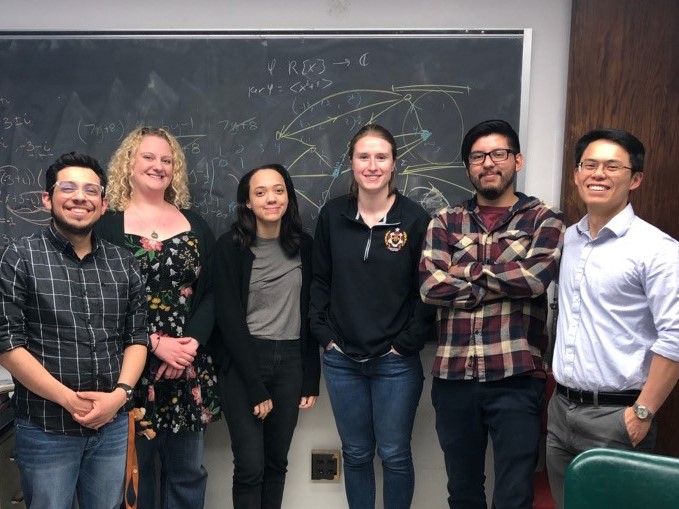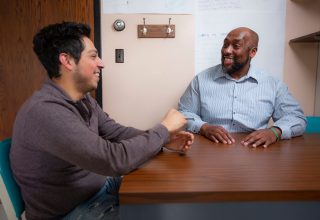Post-baccalaureate Program Provides Bridge to Success for Many Students
Author: Lona

Author: Lona

BY ANGIE HAGERTY
Makayla Cowles (post-baccalaureate certificate program ’19 math) spent the last two semesters thriving in the postbac certificate program in the Department of Mathematics.
After mastering combinatorics, successfully navigating partial differential equations and achieving excellent grades, she’s now enrolled in a Ph.D. program at the University of Colorado, Denver.
“A year ago, I didn’t think it was possible to get my Ph.D.,” Cowles said. “Bottom line. I didn’t have enough math background to succeed in graduate school. Without the postbac program, my successes would not be happening.”
Although Cowles enjoyed earning her undergraduate degree in mathematics from a small college, the program lacked the advanced math courses that most Ph.D. programs require.
This left her in academic limbo.
“I became interested in earning my Ph.D. when I was nearly finished with my undergraduate studies,” she said. “I felt stuck. I was academically unprepared for graduate school and I needed a bridge from my undergraduate degree to graduate school.”
To explore these issues and consult with math faculty from around the country, Makayla attended the Field of Dreams math conference in St. Louis. She struck up a conversation with Michael Young, an associate professor of mathematics at Iowa State who was slated to speak at the conference.
He encouraged Cowles to look into Iowa State’s program. She applied immediately after the program began accepting applications.
The one-year postbac certificate is designed to help undergraduate degree holders smoothly transition into the rigors of a graduate mathematics program.
“Iowa State’s program is rare and also unique in many ways,” Young said. “We exclusively offer graduate courses and we provide them with paid teaching assistant positions. Our program serves more graduate students than any other postbac program in the country.”
The program is uniquely funded as well. It exclusively relies on support from the math department, the College of Liberal Arts and Sciences and private donations.
“Because we don’t use federal dollars, we’re able to accept international students, which is also unique,” Young said.
The Department of Mathematics established the postbac program in 2018. Its first cohort of six students enrolled last fall. Drawn from groups which are often underrepresented in STEM, the inaugural postbac student group included two men of color and three women.
The program’s coursework shores up math skills while building an impressive record of graduate-level success. Dedicating a year to strengthening math skills demonstrates a strong commitment to achieving math success. This investment carries heavy weight on graduate school applications.
“The postbac program accepts bright students with potential, and then we give them the tools to thrive,” said Hal Schenck, professor and chair of the Department of Mathematics.
In addition to serving as teaching assistants, students receive mentoring from top faculty and professional development, which guides them through the graduate school application process.

The reasons for entering the program are as varied as the personal narratives and academic experiences of those who apply. Each applicant has a one-of-a-kind math story.
Some students enter the postbac program immediately after earning their undergraduate degrees. Others enroll after being away from academia for several years.
“I taught high school math for three years, and sometimes when I was grading papers, I felt a yearning to return to college and earn my Ph.D.,” said Kevin Liu, a member of the 2018-19 cohort. “However, I was afraid that graduate school would be tough after being away from academia for a while. My advanced math skills were rusty and I had some catching up to do.”
After learning that Iowa State’s program offered faculty mentoring and tailored course plans, he applied and was accepted.
“I remember thinking that this program is exactly what I need—just one year to sharpen my math skills and to show graduate colleges what I can do,” he said.
After eight months in the program, Liu was accepted into the Ph.D. program in mathematics at the University of Washington in Seattle, a highly competitive program with only 17 open spots.
“All I ever wanted was a chance,” Liu said. “This program was perfectly suited for me. It enabled me to get where I wanted to go.”
Jose Lopez (postbac certificate program, ’19 math) learned in March that he was accepted into the Department of Pure Mathematics and Mathematical Statistics at the University of Cambridge, in the United Kingdom.
“I applied to graduate schools last year and didn’t make it,” said Lopez. “A year in the postbaccalaureate program made all of the difference. Now, I’ll be attending my dream school.”
Lopez credits the program and also Young, his mentor and advisor, with these accomplishments.
“Michael Young created an incredible community of support for Iowa State math students. I am fortunate to have a mentor and an advisor who was so invested in my success,” Lopez said.
Eight students began the 2019-20 postbac program in August. “We’re committed to these students and we’re excited about generating yet another chapter of postbac success stories,” Schenck said. “When our students go on to accomplish great things, this validates the effectiveness of our program and reaffirms its tremendous potential.”
The math department continues to attract external support from strategic partners who keep the program funded and sustainable. John Deere recently donated a generous $2,000 grant. The department has earmarked the money for student textbooks and other essential materials.
“We’re always looking for additional support as we help these bright, hardworking students get to the next level,” Schenck said. “Contributions from valued partners like John Deere ensure that students have what they need to succeed.”
For students like Cowles, who had ruled out graduate school, this program provides an essential bridge that allows them to reach the next milestones in their academic journey.
“The postbac program allowed me to achieve things that I didn’t know that I was capable of doing,” Cowles said. “I’m so glad that I met Michael that day and that I had the privilege of spending a year in this life-changing program.”